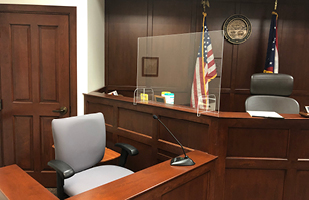Probate-Juvenile Court Ends Backlog Despite Virus

The Delaware County Probate and Juvenile Court is entering a new phase to protect employees and the public during the COVID-19 pandemic.

The Delaware County Probate and Juvenile Court is entering a new phase to protect employees and the public during the COVID-19 pandemic.
The coronavirus made court scheduling in Ohio difficult in late winter and spring, but the Delaware County Juvenile-Probate Court is about to make summer a season without delays.
“We have little to no backlog moving into the summer,” said Judge David A. Hejmanowski, who credits Supreme Court technology grants and the help of the local bar association.
The court postponed only jury trials, where the Sixth Amendment’s Confrontation Clause calls for defendants to face their accusers in person in almost all cases.
“The Supreme Court of Ohio's emergency technology grants equipped courts across the state with $6 million in cameras, microphones, video software, and other technology to allow us to continue to conduct hearings remotely,” Judge Hejmanowski said.
Now, this court is entering a new phase:
- Masks are mandatory for all employees and provided for all visitors. The court asks those who are not feeling well, have a temperature or have been recently exposed to the coronavirus to stay away from the court building.
- Trials and evidentiary hearings will go back to being in person due to the Confrontation Clause, but with safety measures in place
- All other matters, including marriage licenses, will continue to take place via remote technology
- Plexiglas is being installed in probate and juvenile clerical windows
- Filings will be accepted by mail, email, e-filing, fax, drop boxes, or in person at either clerk's office window, with e-filing preferred
- In-person public access to hearings to be restricted to a safe number of persons in the courtroom at a time
- Tables have been moved apart and seating reduced in courtrooms and waiting rooms for proper spacing of parties
- Litigants will be taken immediately to courtroom or conference room
- Markings have been installed on floors of common areas and clerk's offices to control public flow
- Physical distancing continues.
Chief Justice Maureen O’Connor “has continually stressed to Ohio's judges that courts are not like restaurants or retail establishments,” Judge Hejmanowski said. “People don't voluntarily come to us for recreation or entertainment. People come to court because they have necessary business to do or because they have been summoned to be before us.”
“We have a responsibility to be open to allow them to conduct that business, but also to make sure that we do it in a way that assures them, and our court employees of their safety and well-being,” he said.
The coronavirus pandemic brought a decrease in some types of filings, such as traffic offenses, which declined due to fewer people driving. But there was no change year-over-year in filings for marriage licenses, estates, guardianship applications and more.
“These are the essential functions of a court that must be carried out so that people can get on with their day-to-day activities,” the judge said. “And we must, despite the current circumstances, be there to help them through those times- whether they be happy, sad, or just essential.”
Studies conducted in New Jersey, North Dakota, Maine and Michigan show that switching to telephone and video hearings resulted in large increases in appearance and participation rates.
“It's not the phone call that is the barrier to participation,” Judge Hejmanowski said. “It's the transportation and time off of work that it takes to get there physically.”


